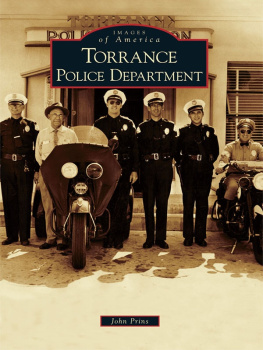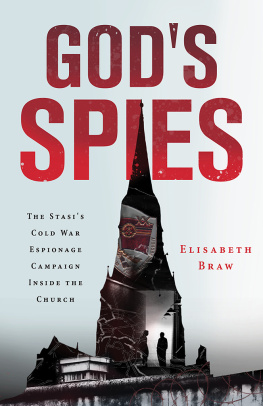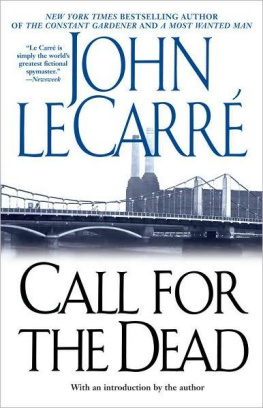JOHN LE CARR
The Looking Glass War

PENGUIN BOOKS
Contents
PENGUIN MODERN CLASSICS
THE LOOKING GLASS WAR
John le Carr was born in 1931. His third novel, The Spy Who Came in from the Cold , secured him a worldwide reputation, which was consolidated by the acclaim for his trilogy Tinker, Tailor, Soldier, Spy , The Honourable Schoolboy and Smileys People . His later novels include The Constant Gardener , Absolute Friends , The Mission Song and A Most Wanted Man . Our Kind of Traitor is his most recent novel.
To James Kennaway
I wouldnt mind being a Pawn, if only I might join
Alice
Foreword
None of the characters, clubs, institutions nor intelligence organisations I have described here or elsewhere exists, or has existed to my knowledge in real life. I wish to make that very clear.
My thanks are due to the Radio Society of Great Britain and to Mr R. E. Molland, to the editors and staff of Aviation Week and Space Technology and Mr Ronald Coles, all of whom provided me with valuable technical advice; and to Miss Elizabeth Tollinton for her secretarial help.
I must thank above all my wife for her untiring cooperation.
John le Carr,
Agios Nikolaos,
Crete
May, 1964
The carrying of a very heavy weight such as a large suitcase or trunk, immediately before sending practice, renders the muscles of the forearm, wrist and fingers too insensitive to produce good Morse
F. Taits Complete Morse Instructor , Pitman.
PART ONE
Taylors Run
A fool lies here who tried to hustle the East
Kipling
Snow covered the airfield.
It had come from the north, in the mist, driven by the night wind, smelling of the sea. There it would stay all Winter, threadbare on the grey earth, an icy, sharp dust; not thawing and freezing, but static like a year without seasons. The changing mist, like the smoke of war, would hang over it, swallow up now a hangar, now the radar hut, now the machines; release them piece by piece, drained of colour, black carrion on a white desert.
It was a scene of no depth, no recession and no shadows. The land was one with the sky; figures and buildings locked in the cold like bodies in an icefloe.
Beyond the airfield there was nothing; no house, no hill, no road; not even a fence, a tree; only the sky pressing on the dunes, the running fog that lifted on the muddy Baltic shore. Somewhere inland were the mountains.
A group of children in school caps had gathered at the long observation window, chatting in German. Some wore ski clothes. Taylor gazed dully past them, holding a glass in his gloved hand. A boy turned round and stared at him, blushed and whispered to the other children. They fell silent.
He looked at his watch, making a wide arc with his arm, partly to free the sleeve of his overcoat and partly because it was his style; a military man, he wished you to say, decent regiment, decent club, knocked around in the war.
Ten to four. The plane was an hour late. They would have to announce the reason soon over the loudspeaker. He wondered what they would say: delayed by fog, perhaps; delayed take-off. They probably didnt even know and they certainly would not admit that she was two hundred miles off course, and south of Rostock. He finished his drink, turned to get rid of the empty glass. He had to admit that some of these foreign hooches, drunk in their own country, werent at all bad. On the spot, with a couple of hours to kill and ten degrees of frost the other side of the window, you could do a lot worse than Steinhger. Hed make them order it at the Alias Club when he got back. Cause quite a stir.
The loudspeaker was humming; it blared suddenly, faded out and began again, properly tuned. The children stared expectantly at it. First, the announcement in Finnish, then in Swedish, now in English. Northern Air Services regretted the delay to their charter flight two-nine-zero from Dsseldorf. No hint of how long, no hint of why. They probably didnt know themselves.
But Taylor knew. He wondered what would happen if he sauntered over to that pert little hostess in the glass box and told her: two-nine-zero will be a bit of time yet, my dear, shes been blown off course by heavy northerly gales over the Baltic, bearings all to Hades. The girl wouldnt believe him, of course, shed think he was a crank. Later shed know better. Shed realise he was something rather unusual, something rather special.
Outside it was already growing dark. Now the ground was lighter than the sky; the swept runways stood out against the snow like dykes, stained with the amber glow of marking lights. In the nearest hangars neon tubes shed a weary pallor over men and aeroplanes; the foreground beneath him sprang briefly to life as a beam from the control tower flicked across it. A fire engine had pulled away from the workshops on the left and joined the three ambulances already parked short of the centre runway. Simultaneously they switched on their blue rotating lights, and stood in line patiently flashing out their warning. The children pointed at them, chattering excitedly.
The girls voice began again on the loudspeaker, it could only have been a few minutes since the last announcement. Once more the children stopped talking and listened. The arrival of flight two-nine-zero would be delayed at least another hour. Further information would be given as soon as it became available. There was something in the girls voice, midway between surprise and anxiety, which seemed to communicate itself to the half-dozen people sitting at the other end of the waiting-room. An old woman said something to her husband, stood up, took her handbag and joined the group of children. For a time she peered stupidly into the twilight. Finding no comfort there, she turned to Taylor and said in English, What is become of the Dsseldorf plane? Her voice had the throaty, indignant lilt of a Dutchwoman. Taylor shook his head. Probably the snow, he replied. He was a brisk man; it went with his military way.
Pushing open the swing door, Taylor made his way downstairs to the reception hall. Near to the main entrance he recognised the yellow pennant of the Northern Air Services. The girl at the desk was very pretty.
Whats happened to the Dsseldorf flight? His style was confiding; they said he had a knack with little girls. She smiled and shrugged her shoulders.
I expect it is the snow. We are often having delays in Autumn.
Why dont you ask the boss? he suggested, indicating with a nod the telephone in front of her.
They will tell it on the loudspeaker, she said, as soon as they know.
Whos the skipper, dear?
Please?
Whos the skipper, the captain?
Captain Lansen.
Is he any good?
The girl was shocked. Captain Lansen is a very experienced pilot.
Taylor looked her over, grinned and said, Hes a very lucky pilot anyway, my dear. They said he knew a thing or two, old Taylor did. They said it at the Alias on Friday nights.
Lansen. It was odd to hear a name spoken out like that. In the outfit they simply never did it. They favoured circumlocution, cover names, anything but the original: Archie boy, our flying friend, our friend up north, the chappie who takes the snapshots; they would even use the tortuous collection of figures and letters by which he was known on paper; but never in any circumstances the name.
Lansen. Leclerc had shown him a photograph in London: a boyish thirty-five, fair and good-looking. Hed bet those hostesses went mad about him; thats all they were, anyway, cannon-fodder for the pilots. No one else got a look in. Taylor ran his right hand quickly over the outside of his overcoat pocket just to make sure the envelope was still there. Hed never carried this sort of money before. Five thousand dollars for one flight; seventeen hundred pounds, tax free, to lose your way over the Baltic. Mind you, Lansen didnt do that every day. This was special, Leclerc had said so. He wondered what she would do if he leant across the counter and told her who he was; showed her the money in that envelope. Hed never had a girl like that, a real girl, tall and young.
Next page
















